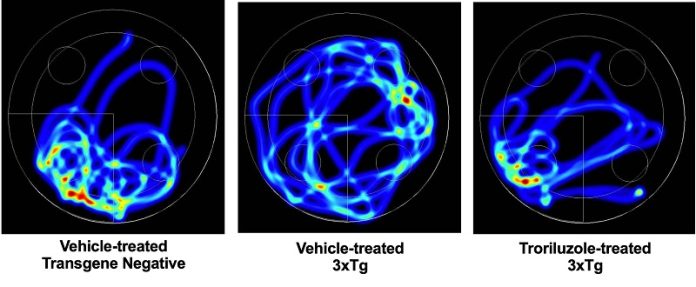
In a recent breakthrough in Alzheimer’s research, scientists at Auburn University have discovered a new drug, troriluzole, that could help prevent memory loss and cognitive decline.
The research, led by Dr. Miranda Reed and Dr. Michael Gramlich, has shown promising results in mice that were genetically modified to mimic early stages of Alzheimer’s disease.
This study, published in the Journal of Neurochemistry, is the first to show how troriluzole can target brain changes linked to memory loss.
Alzheimer’s disease is a condition that affects millions of people worldwide. It gradually leads to memory problems, confusion, and difficulty performing everyday tasks. Despite years of research, a cure for the disease has not yet been found.
The brain of a person with Alzheimer’s is marked by the build-up of harmful proteins called amyloid plaques and tau tangles, which disrupt communication between brain cells.
In the early stages of Alzheimer’s, high levels of a brain chemical called glutamate can cause overactivity in synapses, the connections between nerve cells. This damages the brain and contributes to memory problems.
The Auburn University study focused on how troriluzole might prevent these early-stage changes in the brain. Mice that were genetically modified to develop Alzheimer’s were treated with this new drug. The results were promising: the mice treated with troriluzole showed lower levels of harmful glutamate in the brain. As a result, their memory and learning abilities improved significantly.
“Our research shows that by targeting the brain’s activity early on, we might be able to slow down or even prevent Alzheimer’s progression,” explained Dr. Reed, a professor at Auburn’s Department of Drug Discovery and Delivery.
Dr. Gramlich, an assistant professor of biophysics and co-researcher on the study, added, “This work shows how new scientific discoveries can change how we understand and treat complex diseases like Alzheimer’s.”
In the study, the mice that received troriluzole performed better in memory tests, such as maze navigation. These tests help measure the effects of the drug on cognitive abilities. According to the researchers, the drug seems to protect the brain by reducing harmful overactivity, which leads to better memory and learning.
The researchers describe it as fixing a car engine before it breaks down completely. “By protecting the brain at a fundamental level, we may be able to improve people’s lives in a big way,” said Dr. Reed.
While these results are promising, the researchers emphasize that more studies are needed to understand how troriluzole works at different stages of Alzheimer’s. The hope is that this drug could one day offer a new way to treat people with Alzheimer’s and slow down memory loss.
“This is just the beginning, but we are hopeful that troriluzole could be a game-changer in Alzheimer’s treatment,” Dr. Gramlich said.
The research involved collaboration between Auburn University’s College of Science and Mathematics, the Harrison College of Pharmacy, and other experts.
While further studies are needed, this discovery brings hope for millions affected by Alzheimer’s disease.
If you care about Alzheimer’s disease, please read studies about vitamin D deficiency linked to Alzheimer’s and dementia, and strawberries can be good defence against Alzheimer’s.
For more health information, please see recent studies about foods that reduce Alzheimer’s risk, and oral cannabis extract may help reduce Alzheimer’s symptoms.
Source: Auburn University.



